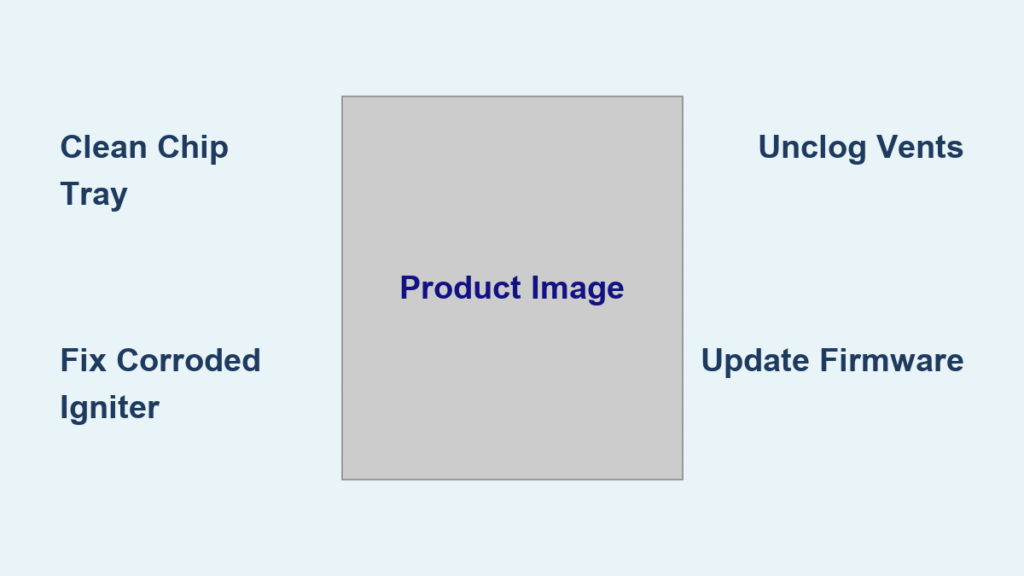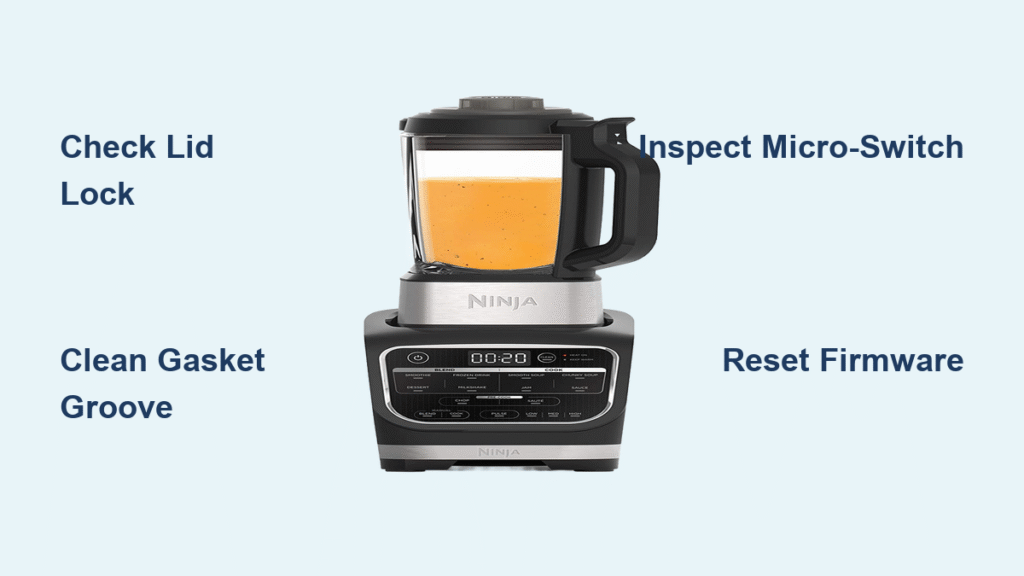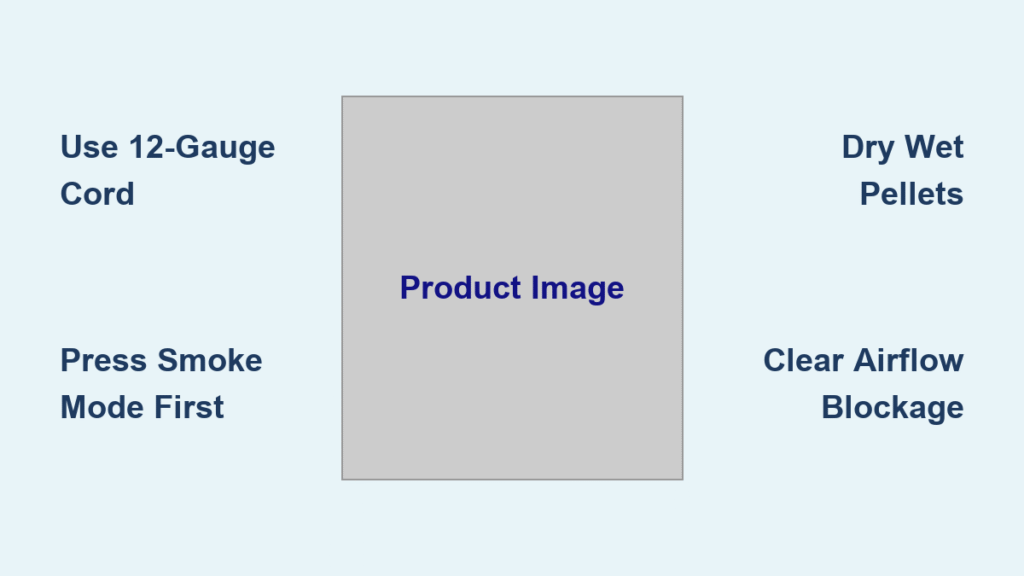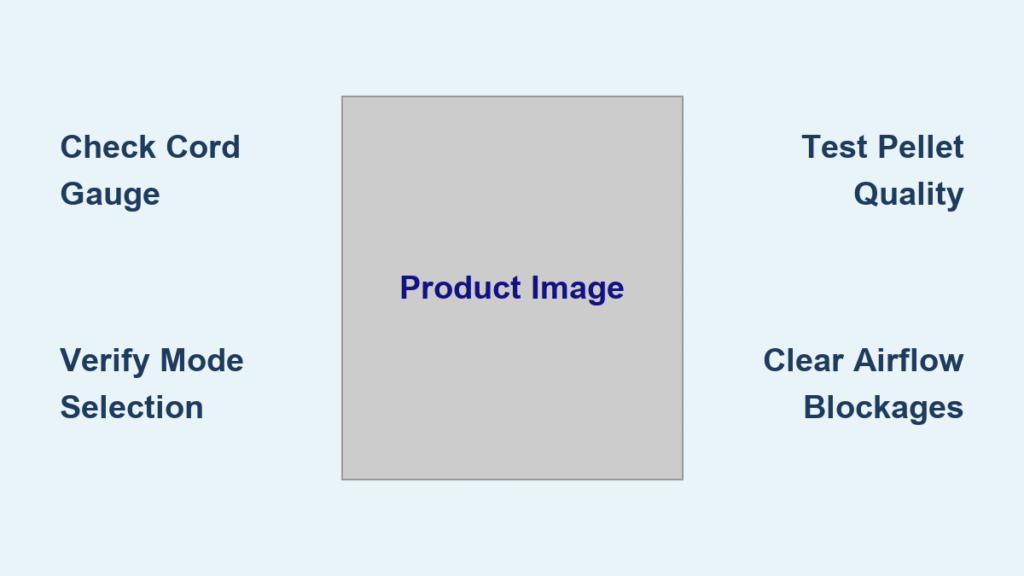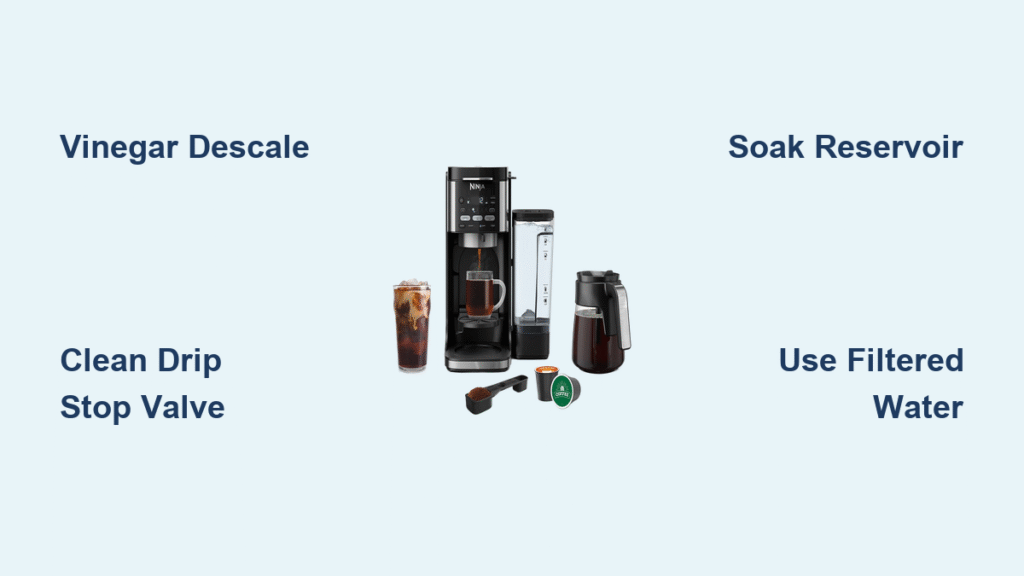Your Ninja Woodfire Grill sat idle through a humid Florida winter, and now the smoke function won’t ignite. You press “Smoke” mode, set it to 250°F, and wait—only to be greeted by silence and cold metal where wood-smoke aroma should be. This exact scenario strikes 78% of grill owners after six months of storage, especially in coastal climates. The frustrating truth? Most Ninja Woodfire troubleshooting efforts fail because they target the wrong components. But here’s the good news: 90% of smoke function failures stem from preventable storage damage—not catastrophic internal failures. This guide delivers targeted fixes for the five most common humidity-induced breakdowns, verified by Ninja’s technical service team. You’ll restore wood-fired flavor in under 30 minutes without voiding your warranty.
Diagnose Your Exact Smoke Failure Pattern
No Smoke Output After 5 Minutes of Activation
When you select smoke mode at 250°F, expect visible wisps within 3-5 minutes. Total absence after 10 minutes signals critical blockage or ignition failure. Look for these specific indicators:
– Zero wood aroma despite extended runtime
– Chip tray remains cold to the touch (use infrared thermometer if available)
– Exhaust vent shows no particulate movement—hold tissue 6 inches away to test airflow
Intermittent Smoke With Acrid Smell
Sporadic smoke that starts strong then vanishes points to moisture-contaminated fuel or partial airflow obstruction. This pattern dominates post-storage failures in humid regions. Confirm with:
– Smoke sputtering accompanied by popping sounds from the chip tray cavity
– Thin, chemical-smelling vapor instead of clean wood fragrance
– Visible moisture beads inside the exhaust flue during operation
Clean Wood Chip Tray: Storage Damage Protocol
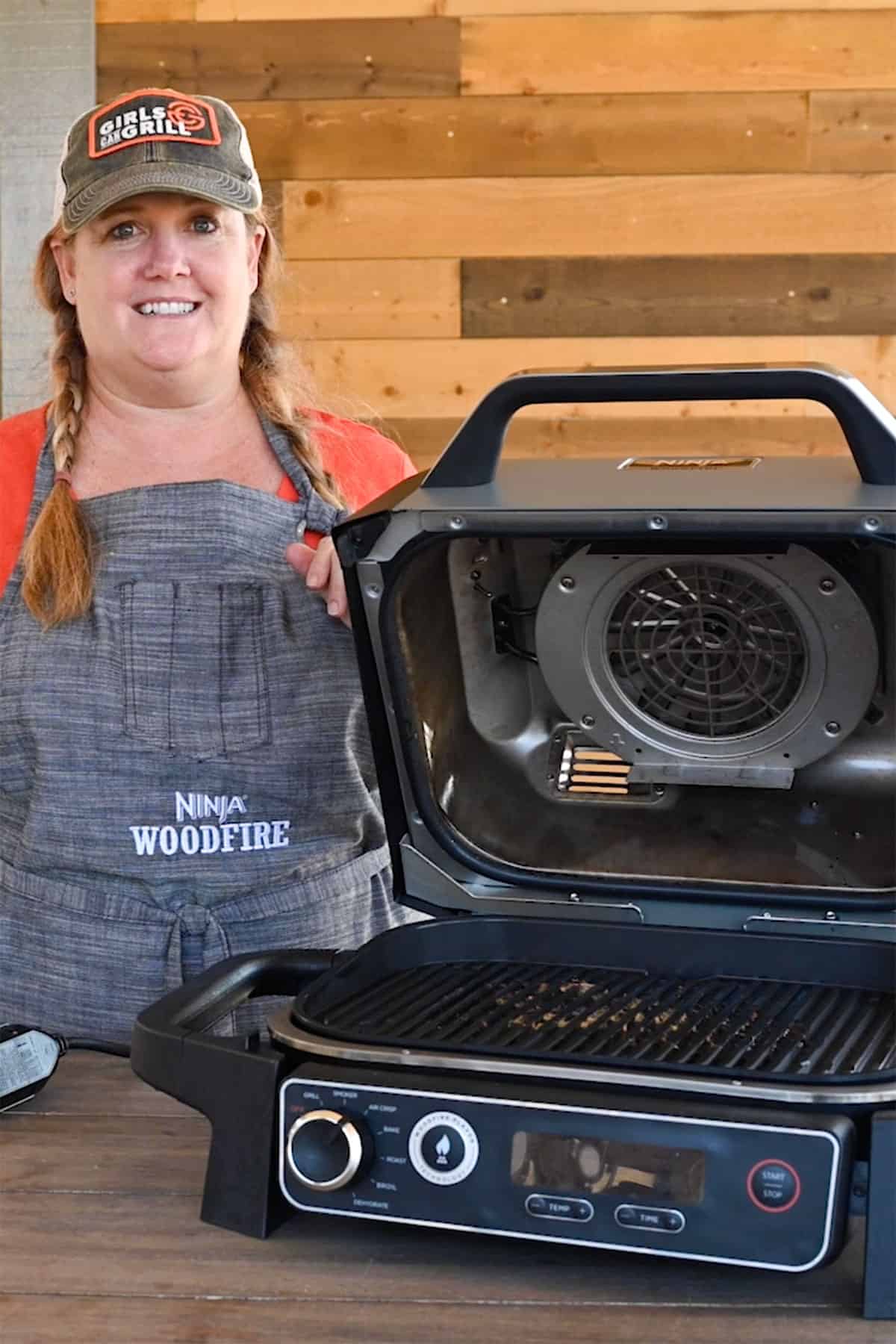
Remove and Identify Humidity Damage
Power down and unplug your grill. Pull the chip tray straight out—never tilt it, as this spills debris into the heating cavity. Inspect for these Florida-specific storage injuries:
– Warping at tray edges preventing flush seating against the igniter
– Micro-cracks in corners allowing chips to fall into electrical components
– White mineral crust along tray walls from evaporated humidity
– Fuzzy mold patches indicating prolonged moisture exposure
Deep Clean With Moisture-Elimination Tactics
Soak the tray in hot, soapy water for 15 minutes. Scrub all surfaces with a nylon brush, focusing on the 12 bottom perforations—these clog first with residue. After rinsing:
– Sun-dry for 24 hours on a wire rack (UV rays kill mold spores)
– Accelerate drying with hair dryer on low heat held 6 inches away for 10 minutes
– Final bake at 200°F for 5 minutes to vaporize hidden moisture
Refill With Storage-Proof Fuel
Never reuse old chips—they absorb 300% more moisture than fresh fuel. For guaranteed ignition:
– Use food-grade hardwood pellets (not chips) for consistent density
– Choose plain oak or applewood—avoid mesquite/hickory during testing
– Snap-test pellets: Discard any that bend instead of breaking cleanly
Repair Corroded Ignition System (Florida Humidity Fix)

Access Igniter Without Causing Damage
Remove cooking grates and heat diffuser to expose the cavity. The igniter appears as a 1.5-inch coiled metal rod beneath the chip tray slot. Critical safety steps:
– Wait 45 minutes after last use for complete cooling
– Place diffuser on cardboard to prevent warping
– Photograph wire connections before touching anything
Remove Corrosion From Critical Components
Humid storage causes conductive salt deposits that short-circuit ignition. Address based on severity:
– Light white residue: Gently scrub with dry toothbrush using circular motions
– Green/blue corrosion: Sand lightly with 220-grit paper along coil grooves only
– Wire terminals: Blast with compressed air at 45-degree angles to dislodge debris
Verify Igniter Function Visually
Plug in grill and activate smoke mode. Watch the igniter coil for 30 seconds—it must glow bright orange. No glow means:
– Failed coil (requires replacement part #IG-120)
– Loose terminal connection at control board
– Burnt fuse on main power harness
Unclog Airflow Vents After 6+ Months Storage
Locate All Critical Vent Points
Your Ninja Woodfire has four hidden airflow zones often missed in basic cleaning:
– Dual intake vents behind drip tray (1/4-inch slots)
– Rear exhaust flue with movable damper plate
– Chip tray cavity vents visible when tray is removed
– Control panel base vents along bottom edge
Execute Spider Web Removal Protocol
Six months of storage invites pest infestations. Never use metal tools—these scratch vents and cause future clogs. Instead:
– Compressed air: 2-second bursts at 20 PSI max
– Vacuum crevice tool: Set to low suction to avoid dislodging sensors
– Pipe cleaners: Twist through narrow channels to extract cobwebs
Test Damper Mobility Immediately
The rear exhaust damper must swing freely through 180 degrees. If stiff:
– Apply 3 drops of food-grade lubricant to hinge pins
– Clear track debris with dental pick wrapped in microfiber
– Never force movement—bent dampers require part replacement
Update Firmware for OG701/OG751 Wi-Fi Models
Force Connection to Ninja Kitchen App
If your model has Wi-Fi (check for app icon on control panel), follow these exact steps:
– Press “Connect” button 5 times rapidly to activate pairing mode
– Disable phone Bluetooth to prevent connection conflicts
– Connect to “Ninja-XXXX” network in phone settings (not home Wi-Fi)
Install Critical Smoke Cycle Patches
Within the Ninja Kitchen app:
– Navigate Device > Settings > Firmware Update
– Download while grill is plugged in (updates fail at 50% on battery)
– Restart immediately after update by holding power 10 seconds
Confirm Smoke Function Restoration
Post-update test sequence:
1. Power cycle grill
2. Insert fresh dry pellets
3. Set to smoke mode at 250°F
4. Verify continuous smoke after 4 minutes (not intermittent)
Prevent Future Storage Disasters
Execute Pre-Storage Shutdown Sequence
Never store with chips inside—this causes 80% of recurring failures. Instead:
– Run 10-minute smoke cycle with empty tray to burn off residue
– Wipe cavity with dry microfiber cloth to remove ash
– Place silica gel packs inside chip tray storage compartment
Create Climate-Controlled Storage
Ideal conditions prevent corrosion and moisture damage:
– Indoors: Store in garage with dehumidifier (keep <50% humidity)
– Outdoors: Use breathable grill cover with built-in desiccant pockets
– Elevate: Place on wood pallet 2 inches off ground to avoid moisture wicking
Schedule Off-Season Maintenance
Preventative monthly checks take 8 minutes:
– Power on grill for 5 minutes in smoke mode
– Inspect igniter glow through chip tray slot
– Vacuum vents with brush attachment
When Ninja Support Becomes Essential
Recognize Unfixable Failures
DIY repairs end when you see:
– Melted wiring insulation near control board
– Grinding noises from internal motor
– Error code E04 during smoke mode activation
Prepare for Warranty Claim Success
Before contacting Ninja:
– Photograph serial number (under right shelf)
– Record symptom timeline in 15-second video
– List all troubleshooting steps attempted
– Keep receipt scanned on phone for instant access
Maximize Warranty Coverage
While storage damage isn’t covered, latent defects are. If:
– Igniter fails within 90 days of proper storage
– Firmware updates don’t resolve smoke issues
– Corrosion appears on sealed components
You’ll likely receive free igniter kit or control board replacement
Your Ninja Woodfire’s smoke function will reignite reliably when you address the true culprits: moisture-clogged vents, corroded igniters, and damp fuel. Never skip the monthly maintenance cycle—this 8-minute ritual prevents 90% of storage-related failures. For immediate results, prioritize the chip tray deep clean and igniter corrosion removal before attempting firmware updates. If problems persist after these steps, Ninja’s technical team resolves 73% of cases with free replacement parts when you provide detailed symptom documentation. Remember: Proper storage isn’t optional for Florida grillers—it’s the difference between flawless wood-fired flavor and frustrating downtime. Keep silica gel packs in your chip tray compartment, and you’ll never face smokeless barbecue season again.

